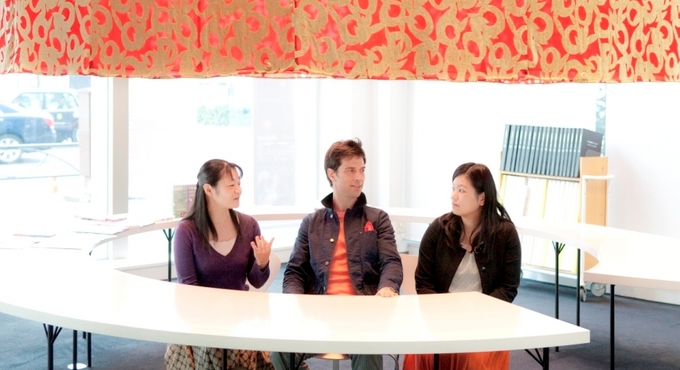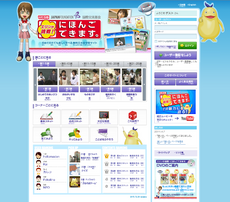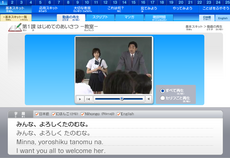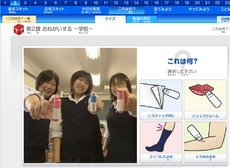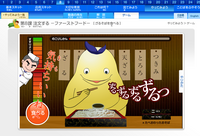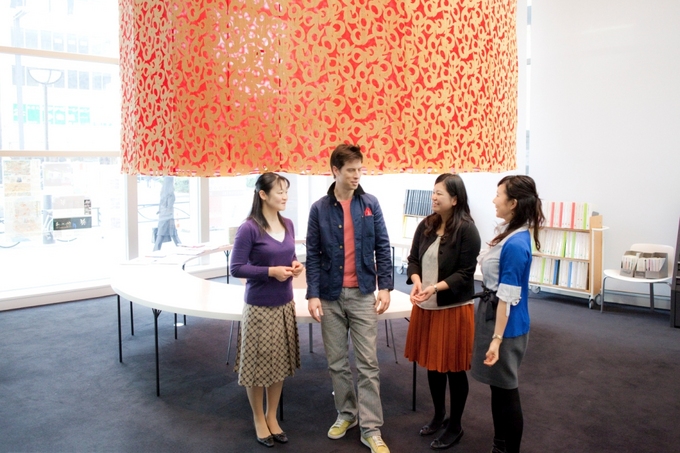Learning Japanese from Scratch and My love for Japanese Culture (Part II)
Continued from Part I Learning Japanese from Scratch and My love for Japanese Culture (Part II)
The following interview took place on March 8th, 2011
Patrick Harlan, known as Pakkun of the Japanese and American comedian duo Pakkun Makkun, shares his experience of learning Japanese. Here he talks with the creator of a Japanese language site about Japanese pop culture vs. traditional culture, his view of Japanese people, and different ideas of learning the Japanese language.
(Interviewed by Keiko Kawashima, Language Education Specialist at The Japan Foundation Japanese-Language Institute, Kansai ; Miyuki Akazawa, Lecturer at The Japan Foundation Japanese-Language Institute, Urawa)
 ――Which aspect of Japanese culture is attractive to you, Pakkun?
――Which aspect of Japanese culture is attractive to you, Pakkun?
I think that Japanese animation and manga comics are, after all, amazing. for the sake of information gathering, I have read the first volume of most of the famous manga comics such as, One Piece, Evangelion, Doraemon, Golgo 13, GTO, Slum Dunk, while I'm not necessarily a fan of them. I'll just read anything but at the same time, I understand very well the appeal of each one.
The language in each of them is interesting, and Japanese writers are all in all amusing.
Horrors stories by Koji Suzuki and Shinichi Fukuoka are truly great. When it comes to Haruki Murakami, I read him in both English and Japanese.
 What I think about Japanese society is that it is quite systematic and formal because of people like "salary men", teachers, and government employees. So the people who dare to work in the creative fields within this society where a lot of things are properly formed tend to stick out. The ones with the most outstanding imagination would do such things and therefore become successful with it too.
What I think about Japanese society is that it is quite systematic and formal because of people like "salary men", teachers, and government employees. So the people who dare to work in the creative fields within this society where a lot of things are properly formed tend to stick out. The ones with the most outstanding imagination would do such things and therefore become successful with it too.
Like I said earlier, I think the aspects of Japanese culture that are popular overseas, having reached foreign markets after going through many filters, do have remarkable appeal, whether it's manga comics, animation, ninjas, samurais, or even Zen.
Probably there are more number of people in the US that practice Zen than in all of Japan. The same thing can be said about the concept of "WA," consensus in a direct translation. The idea of "wa wo tamotsu" (maintain conformity) is sometimes used in English on a normal basis. The Japanese will understand the meaning of the saying, "not breaking down conformity," but you don't hear them. Americans are quite conscious of things, such as inner strength and the martial arts and samurai spirits, things that the Japanese tend to forget about, or rather may not need to be intentionally conscious of.
It's interesting. These are somethings we don't have in American culture.
Learning the Japanese language through Japanese popular culture abroad
――There's a website called Erin's challenge! I can speak Japanese containing various elements of those aspects of Japan's cultural lifestyle. This education program, which began as a language show on NHK TV,has skits for 25 lessons, Has acentral premise to follow a high school girl, Erin as she goes to Japan to study abroad for a semester.
The skit starts with very natural Japanese conversation instead of the typical language lesson's "Hello, nice to meet you" style. A scene with a line like "Hey y'all, I'm looking forward to my stay" would never be in the textbook. It usually will say, "I give my warmest regards to everybody" (it is my pleasure to meet everybody). Each skit also has manga comics along with it and there's even sound. Wow, a talking comic, that's amazing!
――The most popular one amongst the kids in the international school was the " Soba (Buckwheat noodle) sucking game." The sound you make sucking up noodles, "hurrrrrl," was a hit with the kids.
I've only tried them briefly but the depth of entertainment of each site surprises me.
――For those who only want to know about Japanese culture, there are quizzes you can take called, "What's this?" Can you tell what is going on in this photo with 3 high school girls taking out what looks like a glue stick?
Ah, the good old days. This is from the second skit Pakkun & Makkun wrote. I'm wearing a pair of "loose socks" glued to my legs in the setting and there was a phrase in the skit that you can pull your hair out with the glue stick. We can't use this skit any more since it's out of fashion.
But isn't it really strange that they put glue directly on their skin?
――So, it was so shocking that you made a skit out of it, right?
Yeah, it's really strange. The fact that this product comes into fashion, in itself, is distinctive Japanese style. There are some other games on this site I don't even know. And oh, these are all free, huh? If I showed it to my son, he would love it. For people who really want to study traditional Japanese culture, there's a game where you can experience "ikebana" (Japanese flower arrangement) too. I don't know any other website that is this elaborate.
――A lot of teenagers overseas don't get the chance to come to Japan. We imagine they would want to know about the lifestyle of other kids their age. The site is designed so that from anywhere in the world they would virtually experience bits of a Japanese teenager's everyday life that are not in textbooks.
This is a kind of thing that you can only do with websites. I wish I had this website 15 years ago!
 ――Do you have any fun ideas for future learning sites?
――Do you have any fun ideas for future learning sites?
The learner could have the role of a Japanese style bar manager, taking orders, saying, "My pleasure," and then calling out,, "Order for 2 beers!" into the back kitchen. If you say, "Here's your check," the customer will answer, "Here's 1200 yen." The challenge in the game is to follow the conversation and manage the busy bar all at once. If possible, I would also like a comedian version of these games.
Say, for learning Kanji reading, it would be fun to have ones like "dajare (pun)", "ochi (punch line)", and "ootori (headliner)". You would also get to know the comedy culture of Japan. Kansai dialect may become absolutely necessary in this and it could teach learners to say, "Honmakaina (you gotta be kidding me)." Oh, please definitely use this idea. (laughing) Japanese culture that Japan can proudly share with the world, through Pakkun's eyes ――Manazai (duo style comedy) is a respectable cultural artifact of Japan, isn't it? I think it makes Japanese comedy funnier than any other country's comedy. What other aspect of our culture do you like? ――That sure is a piece of Japanese culture to be proud of that we should share with the world. That's what I think. I didn't have enough money to go home the first Christmas after I came to Japan, and so I went home for the second one. The present I got for my parents then was the warm-up toilet seat (laughing). They were super happy. But you know, the voltage is a little higher in the US, so we found out that you get a low temperature burn from sitting on it. I also love karaoke. I learned some Japanese through Enka songs too. My speciality is "Woman Awaits" by Hiroshi Itsuki. There's the hospitality of Japan as well. Even the fine details in machines like how they actually speak, "Your hot tub is ready." As it is fundamental to Japanese culture, the consideration of others through respect and good manners, is the most distinct and the best part of Japan. I think this shows an amazing sense of cooperativeness. *1 WEB version of Erin's challenge! I can speak Japanese. http://www.erin.ne.jp/en/ The Japan Foundation responds extensively to overseas demands for Japanese-language education in ways such as dispatching specialists to overseas Japanese educational organizations and training local Japanese-language teachers. Photo by Kenichi Aikawa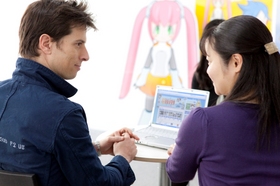 It'll be good for people to experience the piercing wisecracks of Manzai, the style of the comedy duo. In the game, you have to act in the correct style of wisecracking when the slapstick performer says something silly. The slapstick guy goes, "Man, I'm so tired, I only slept for 20 hours last night." You'll get 100 points if you answer, "Hey that's way too much sleep!" but 60 for "What are you talking about?" and 0 for "That's great."
It'll be good for people to experience the piercing wisecracks of Manzai, the style of the comedy duo. In the game, you have to act in the correct style of wisecracking when the slapstick performer says something silly. The slapstick guy goes, "Man, I'm so tired, I only slept for 20 hours last night." You'll get 100 points if you answer, "Hey that's way too much sleep!" but 60 for "What are you talking about?" and 0 for "That's great."
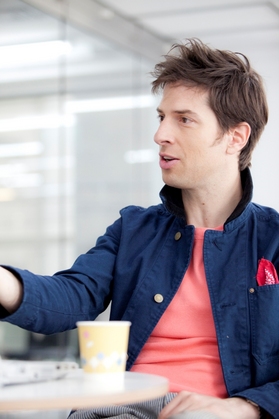 The intelligence of all machines in general is something I appreciate, personally. All railway turnstiles are so fast to get through. And Washlet. There's nothing more joyful in the world than that warmth of the toilet seat.
The intelligence of all machines in general is something I appreciate, personally. All railway turnstiles are so fast to get through. And Washlet. There's nothing more joyful in the world than that warmth of the toilet seat.
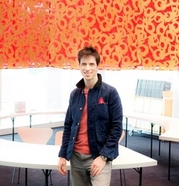 Patrick Harlan is an American entertainer known as Pakkun, who appears in various English-related TV shows. Harlan, born in 1970 in the state of Colorado, came to Japan after graduating from Harvard University with a BA in Comparative Religion. Harlan has passed Level 1 of the Japanese Aptitude Test. He is also an affiliated Professor of Sagami Women's University and his published books include Pakkun's Nakazuri Eisakubun and Big Adventure of Tooth Fairy.
Patrick Harlan is an American entertainer known as Pakkun, who appears in various English-related TV shows. Harlan, born in 1970 in the state of Colorado, came to Japan after graduating from Harvard University with a BA in Comparative Religion. Harlan has passed Level 1 of the Japanese Aptitude Test. He is also an affiliated Professor of Sagami Women's University and his published books include Pakkun's Nakazuri Eisakubun and Big Adventure of Tooth Fairy.
This website was launched in March 2010 to help users learn Japanese language and culture.
Related Articles
Related Events
Back Issues
- 2025.6. 9 Creating a World Tog…
- 2024.10.25 My Life in Japan, Li…
- 2024.5.24 The 50th Japan Found…
- 2024.5.24 The 50th Japan Found…
- 2024.5. 2 People-to-People Exc…
- 2024.5. 2 People-to-People Exc…
- 2023.12. 7 Movie Theaters aroun…
- 2023.6.16 The 49th Japan Found…
- 2023.4.24 The 49th Japan Found…
- 2022.12.27 Living Together with…


